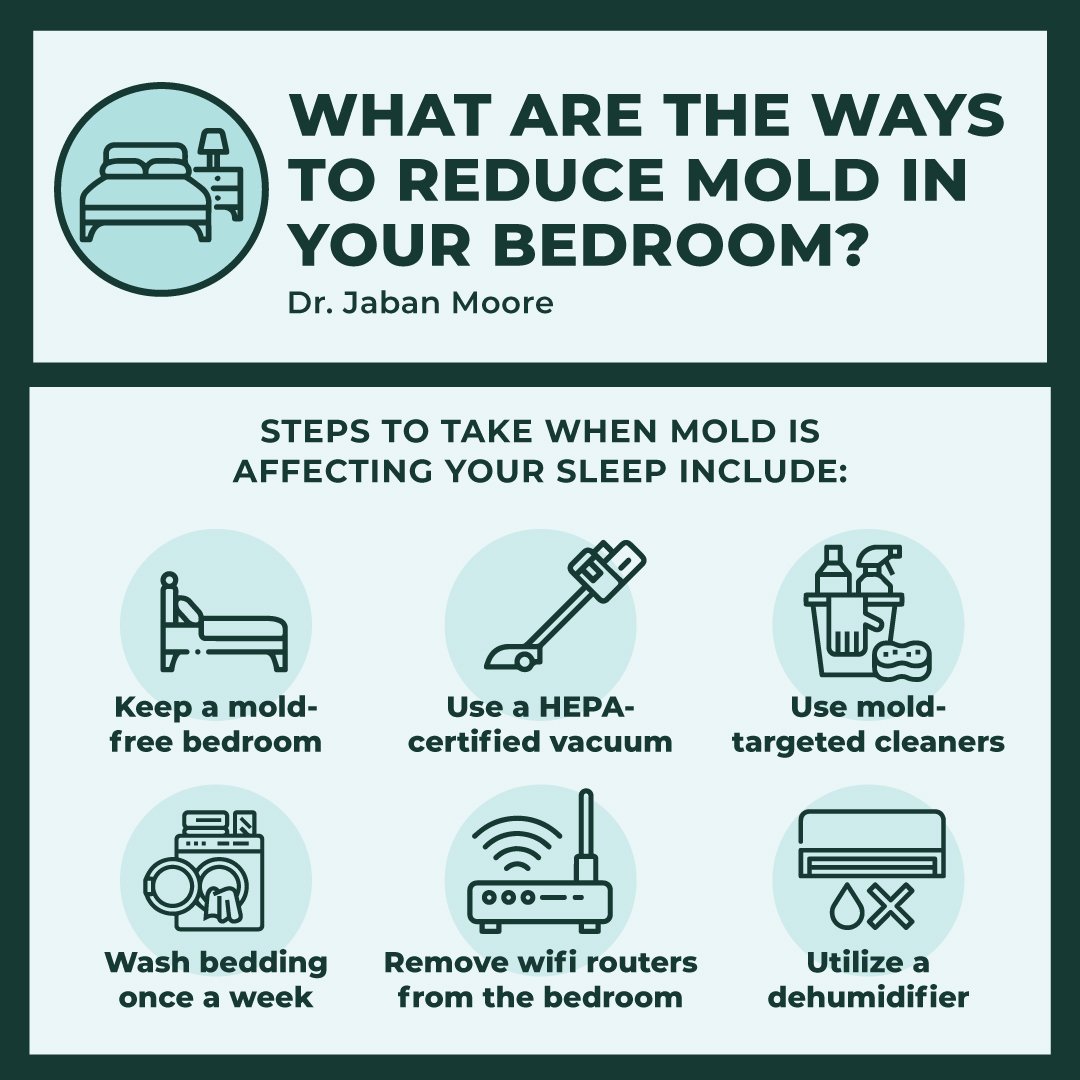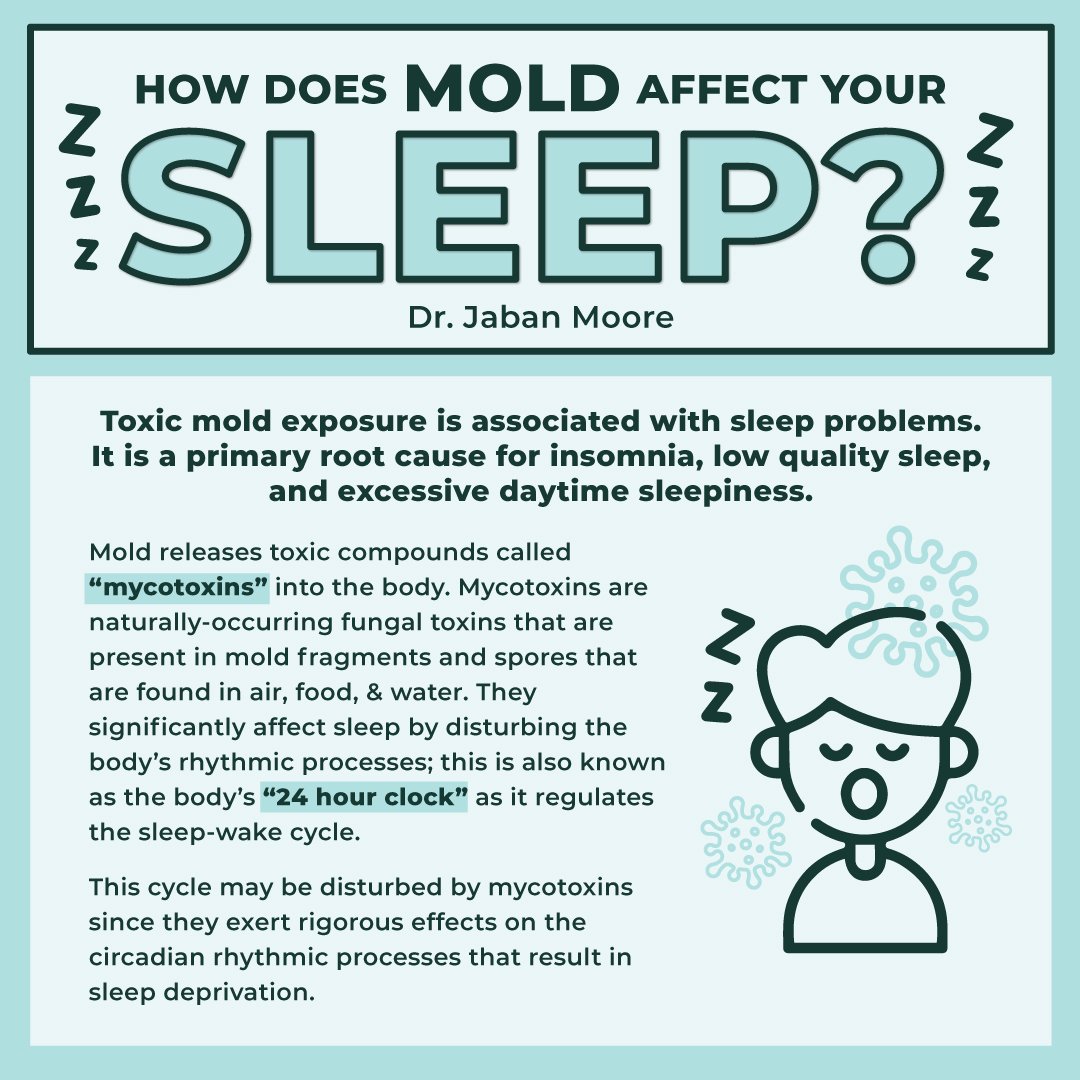Could Mold Toxicities and Parasitic Infections Be Causing Your Sleep Problems?
Could Mold Toxicities and Parasitic Infections Cause Your Sleep Problems?
Yes - mold and parasites have the ability to significantly impact the quality and quantity of your sleep. According to the CDC, 1 in 3 adults do not get enough sleep. If you are consistently waking up tired, waking up multiple times a night, and having falling asleep, mold and/or parasites may be the major root causes for your issues. Similarly, they may cause excessive snoring, teeth grinding (bruxism), and sleep apnea.
How Does Mold Affect Sleep?
Toxic mold exposure is associated with symptoms such as chronic fatigue, brain fog, mental disorders (depression, anxiety, etc.), digestive problems (abdominal pain, leaky gut, food sensitivities, bloating, etc.), respiratory issues, heart palpitations, joint pain, eye problems, and more.
Click here to read our article on mold toxicities!
Additionally, mold directly causes sleep problems. Since mold toxicities affect each person differently, not all people will experience sleep disturbances when dealing with mold. However, it is a primary root cause for insomnia, low quality sleep, and excessive daytime sleepiness.
For example, a 2020 study with 11,318 people found that baseline floor dampness, visible mold, and a mold odor at home/work was associated with “difficulty initiating sleep (DIS), difficulty maintaining sleep (DMS), early morning awakening (EMA), insomnia symptoms, snoring and excessive daytime sleepiness (EDS).” Another study states that “subjects living in houses with reported signs of building dampness (n = 2873) had a higher prevalence of insomnia.”
Mold releases toxic compounds called “mycotoxins” into the body. Mycotoxins are naturally-occurring fungal toxins that are present in mold fragments and spores that are found in air, food, and water. They significantly affect sleep by disturbing the body’s rhythmic processes; this is also known as the body’s “24 hour clock” as it regulates the sleep-wake cycle. A 2003 study states that “although sleep is commonly considered a restorative process that is important for the proper functioning of the immune system, it could be disturbed by mycotoxins. Most likely, mycotoxins exert some rigorous effects on the circadian rhythmic processes resulting in sleep deprivation.”
Behind the scenes, mold/mycotoxins attack the immune system. They upset the body’s homeostasis by increasing the production of reactive oxygen species (ROS) and reducing ATP synthesis by hindering mitochondrial functions. When the body’s energy generator, the mitochondria, is stunted, it creates cortisol imbalances (adrenal fatigue), excessive tiredness, and feelings of being “wired and tired.”
Click here to read our article on mitochondrial health!
Exposure to mold/mycotoxins activates the production and actions of pro-inflammatory cytokines. Cytokines are “small secreted proteins released by cells that have a specific effect on the interactions and communications between cells.” If there is an imbalance ratio of pro-inflammatory cytokines to anti-inflammatory cytokines, the immune system becomes suppressed and is not able to properly function. This is why people with mold illness often become sick with infections easily and come down with colds and viruses frequently.
This cycle of an abundance of pro-inflammatory cytokines, mitochondrial damage, and systemic inflammation make for an environment where sleep problems may arise and for other autoimmune diseases and illnesses thrive.
Additionally, mold/mycotoxins are assimilated into the fatty tissue and cells of the body. Since the brain is made up of mostly fat, mold tends to assemble in the brain, causing neurological dysfunctions/damage, thyroid problems, low growth hormone, low MSH, and unbalanced melatonin production. Melatonin, the sleep hormone, can plummet or stop being produced all together in patients with a mold toxicity. This creates an abundance of sleep issues.
What Can I Do if Mold is Affecting My Sleep?
The most important step to take when dealing with mold toxicities is to get out of the moldy environment. Click here to read our article about what to do when burdened with mold!
Steps to take when mold is affecting your sleep include:
1) Keep a mold-free bedroom. Although it is important to move out of mold or remediate completely, it is crucial to maintain a mold-free bedroom. In order for the body to break out of the “fight or flight” pattern, the body/mind must feel safe. Purchasing an air purifier such as the AirDoctor is an excellent way to reduce the amount of dust, mold/mycotoxins, and other air pollutants floating in the bedroom. Additionally, checking the mattress and pillows for mold may be helpful as well as frequently dusting.
Signs of a moldy bedroom include a humid closet, condensation in windows, bubbling in the walls, and a musty odor.
2) Use a HEPA-certified vacuum. HEPA stands for high-efficiency particulate air. Vacuums designed with HEPA filtration systems collect the unseen dirt, rather than sending allergens back into the air. HEPA filters also collect dust mites, pollen, mold, and pet dander. Vacuuming at least twice a week will help reduce mold counts.
3) Use mold-targeted cleaners. The EC3 mold solution spray may be used on soft and hard surfaces. After vacuuming, it may be beneficial to spray the air to kill any residual mold.
4) Wash bedding once a week. Washing the bedding once a week will lead to a reduced toxic load in the bedroom.
5) Remove Wi-Fi routers from the bedroom. Many people with mold illness are also susceptible to EMFs. EMFs multiply mold counts faster and may increase inflammation.
6) Utilize a dehumidifier. If the bedroom is humid, a dehumidifier will lower the risk of mold growing as mold loves humid areas. Humidity should be kept between 30-50%.
How Do Parasites Affect Sleep?
Parasites are a major root cause for all sleep problems. Parasites typically infect the gastrointestinal tract, bloodstream, muscles/joints, the central nervous system (CNS), and brain. When they invade these areas, they disrupt hormones, metabolic processes, and produce systemic inflammation. Moreover, a 2018 study states that “because parasites are multicellular organisms, they can modify certain behaviors to facilitate infection and complete their life cycle.” When parasites facilitate infections, they attempt to do so when the body is in an exhausted state - sleep. Parasites are most active during the nighttime. They are also influenced by the full moon, creating exacerbated symptoms during this time.
Additionally, parasites are known to disrupt the body’s circadian rhythm. A 2019 study states that parasites are capable of “possessing their own circadian clock mechanisms, which can influence their capacity to infect their hosts.” A parasite’s presence controls the nervous system which regulates sleep. If parasites hijack the nervous system, sleep problems may arise.
Studies show that parasites also produce significant amounts of ammonia, a waste product. When the brain is inundated with high levels of ammonia, it can lack the essential enzyme ornithine carbamyl-transferase . This enzyme transfers ammonia to drainage pathways (kidneys and liver). However, if this cannot be done, the ammonia stays in the brain and causes sleep disturbances.
Additionally, parasites may cause nighttime anal itching and teeth griding when asleep.
Click here to read our article on chronic illness caused by parasitic infections!
Overall, parasites directly cause sleep irregularities by releasing toxins in the brain and bloodstream while reproducing during the nighttime hours. Since their goal is to be undetected, they can manifest a bundle of symptoms that may be diagnosed as an autoimmune disease, when in reality… it could be a stealth parasitic infection.
What Can I Do if Parasites are Affecting My Sleep?
If parasites are affecting your sleep, it is important to take the proper steps and sequences to eliminate them.
1) Open Drainage Pathways. This is arguably the most important step when overcoming a parasitic infection. Drainage pathways include the colon, kidneys, liver, lymphatic system, and skin. If these pathways are blocked (constipation, inability to sweat, dehydration, swollen lymph nodes, etc.), the body cannot eliminate pathogens.
Click here to read our article on how to prepare your drainage pathways!
Supporting drainage pathways with supportive herbal blends, vitamins/minerals, and nourishing foods may be needed during this process.
2) Implement Antiparasitic Supplements. After opening drainage pathways, the next step is to kill the parasites. It is STRONGLY recommended to do this with the help of a trained practitioner for a customized protocol and to reduce the risk of any negative reactions!
3) Implement Other Healing Modalities. Infrared saunas, ionic foot baths, castor oil packs, coffee enemas, etc. are great ways to support the body.
Click here to read our article on other detoxification methods!
4) Support the Body After a Cleanse. After a parasite cleanse, supporting the body through nutrition and proper supplementation is needed to maintain full health! A parasite cleanse once or twice a year is recommended to keep the toxic/pathogenic burden in the body down!
If you believe you are dealing with chronic illness, please contact a functional provider. Dr. Jaban Moore, a functional medicine provider, can help you if you are experiencing chronic symptoms.
Please reach out if you are interested in taking your health back! You can give our office a call at (816) 889-9801.
References:
https://www.cdc.gov/media/releases/2016/p0215-enough-sleep.html
https://www.ncbi.nlm.nih.gov/pmc/articles/PMC4982651/
https://www.sciencedirect.com/science/article/pii/S2093791119306419
https://www.sciencedirect.com/science/article/abs/pii/S0889159119303010
https://www.mdpi.com/2072-6651/12/10/619/htm
https://content.iospress.com/articles/mediterranean-journal-of-nutrition-and-metabolism/mnm6-2-03
https://www.ncbi.nlm.nih.gov/pmc/articles/PMC3177368/
https://www.ncbi.nlm.nih.gov/pmc/articles/PMC4898283/
https://www.hindawi.com/journals/tswj/2003/307098/
https://pubmed.ncbi.nlm.nih.gov/32272294/
https://www.ncbi.nlm.nih.gov/pmc/articles/PMC1740947/
https://www.ncbi.nlm.nih.gov/pmc/articles/PMC6354945/
https://www.nature.com/articles/pr2009174
https://www.ncbi.nlm.nih.gov/pmc/articles/PMC2785020/
https://www.ncbi.nlm.nih.gov/pmc/articles/PMC5894504/
https://www.frontiersin.org/articles/10.3389/fcimb.2019.00425/full
https://pubmed.ncbi.nlm.nih.gov/22563224/
https://www.ncbi.nlm.nih.gov/pmc/articles/PMC4587002/



